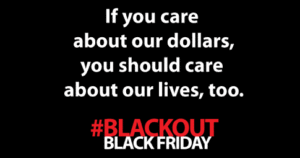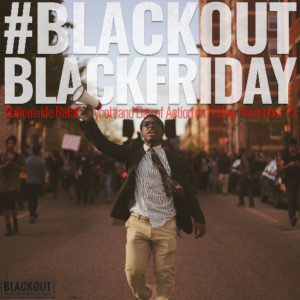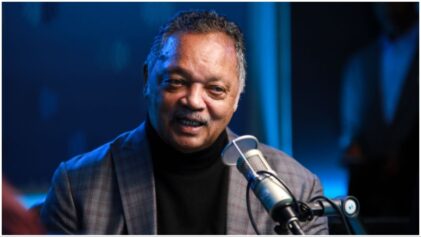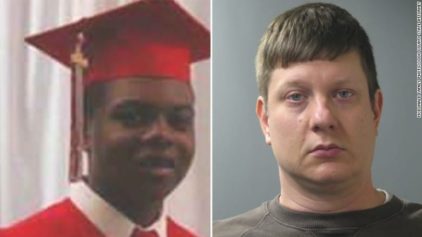“Power concedes nothing without a demand. It never did and it never will. Find out just what any people will quietly submit to and you have found out the exact measure of injustice and wrong which will be imposed upon them,” Frederick Douglass once said.
Perhaps his words are more relevant than ever in the current situation in which Black America finds itself. In light of the killing of Black bodies, most recently the outrage over the videotaped murder of Laquan McDonald, killed by a police officer in a hail of 16 bullets, #BlackLivesMatter protesters in Chicago plan to boycott Black Friday. And there is talk of a national effort to demonstrate that Black lives matter more than money.
Throughout the day on Wednesday, small groups of demonstrators in Chicago came out to protest the McDonald killing, as the Associated Press reported. Two dozen protesters gathered outside Mayor Rahm Emanuel’s office.
“You cannot kill our children and expect us to be quiet any longer,” said protester Quovadis Green. “It is unacceptable.”
Activist Mark Carter, who wants the U.S. Department of Justice to investigate the Chicago police, called on people to “rise up” and shut down the Magnificent Mile shopping area the day after Thanksgiving. He added that protesters were planning to target other landmarks such as the Board of Trade. On the South side of the city, 100 people marched to police headquarters following a community meeting.
Rev. Jesse Jackson planned a major demonstration for Black Friday in Chicago, beginning at 11 a.m. at Michigan Avenue and Wacker Drive and proceeding up to Water Tower Place. The purpose of the action is to bring the world’s attention to what is taking place in Chicago, and call for change through mass demonstrations and voter registration. According to Rev. Jackson, this year 450 shootings have taken place in Chicago, which deserved the same media attention as the terror attacks in Paris and Beirut and the crash of a Russian airliner in Egypt.
“It’s not enough to focus on what brought us here today, the execution of this young man (Laquan McDonald),” Jackson said. “That takes the scab off a deeper sore, a deeper cancer. So we want mass demonstrations, mass voter registration.”
Several politicians, including Rep. Bobby Rush and Rep. Danny Davis, joined Rev. Jackson at a press conference in support of the demonstration.
“The Magnificent Mile will be magnificent when those seeking justice are the citizens of the city of Chicago,” Rush said.

Meanwhile, some voices are speaking out in favor of a national boycott movement. Following the twentieth anniversary of the Million Man March, the Justice Or Else campaign led by Minister Louis Farrakhan launched an economic boycott this holiday season, including a Black Friday boycott taking place until Nov. 30, and a boycott Christmas until Jan. 2. The campaign is using the hashtags #BoycottBlackFriday and #RedistributeThePain on social media to spread the word and build support for the movement. Minister Farrakhan spoke with TV One’s Roland Martin in September about the campaign. “We have to find a way to redistribute the pain,” Farrakhan said, citing Martin Luther King. “We have to now withdraw our economic support, so that those who give us pain can receive some pain in return,” he added, noting that “Black people a carcass where all the vultures gather to suck the life out of us.”
“You’re either going to treat us right, or we’re going to withdraw from you our economic support,” the leader urged. “We intend to boycott Christmas, but not Jesus,” Farrakhan said. “So on Black Friday, we won’t be there.”
Writing for Salon, Shannon M. Houston compared Black Friday to a consolation prize that Black people must reject. She characterizes Black Friday as a day in which people who could not afford material goods throughout the year now have a chance to buy things they may or may not need, rather than have their salaries increased, their rent lowered or their hospital bills covered.
“This consolation prize is especially useful for those many members of black communities who have borne witness to or experienced things like brutality from those sworn to protect and serve them, failing educational systems from which they cannot afford to remove their children and/or the unjust incarceration of a loved one,” she wrote, adding that retail therapy is “a hell of a drug” and a “temporary salve for deep and intricate wounds.” As Houston notes, the protests unfolding on college campuses of late have proven to us that money, not necessarily justice, talks. The hashtags #NotOneDime and #BlackOutBlackFriday have drawn attention to the push for a Black shopper boycott of Black Friday through Cyber Monday, with efforts to encourage the support of Black-owned businesses.
The move towards economic boycott is by no means a new one. The Birmingham Bus Boycott of 1955-1956 is a prime example of what the Black community can do to ensure they no longer finance their oppression. It simply takes the will and the determination.
“The limits of tyrants are prescribed by the endurance of those whom they oppress,” Douglass reminded us. “In the light of these ideas, Negroes will be hunted at the North and held and flogged at the South so long as they submit to those devilish outrages and make no resistance, either moral or physical.”
Over 150 years after the statesman and abolitionist spoke those words, Black people find themselves once again in a state of enslavement. We are treated like slaves and killed in the streets like dogs because we do not appreciate our economic clout, our glorious leverage in the form of over $1 trillion in buying power. Everyone, from community leaders, to national politicians, are speaking out against the murder of Laquan McDonald.
But more than ever, the Black community is being challenged to put its money where its mouth is.


